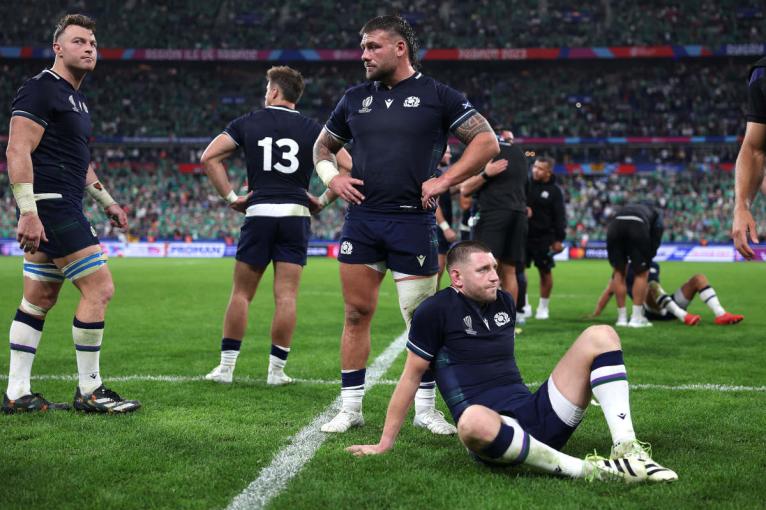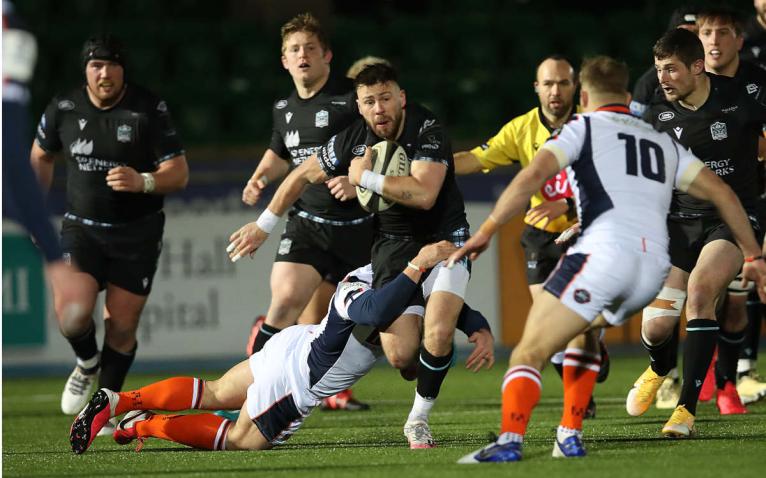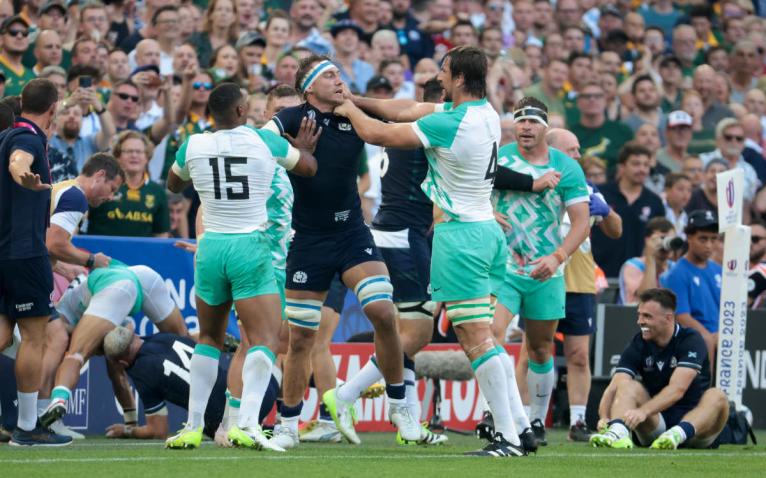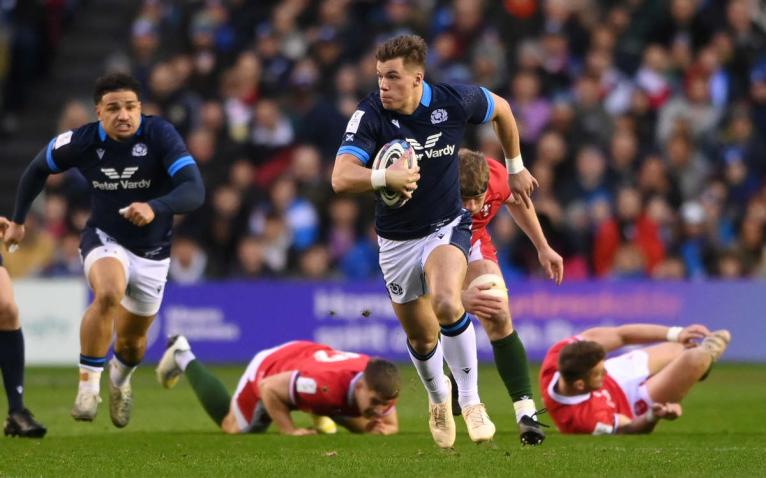Like any Scotland player or coach, Gregor Townsend has suffered in Paris, but rarely has he left the French capital with as vivid a picture of the gap that exists between his team and the best in the world as the one Ireland handed him on Saturday.
In fact, Townsend has more wonderful Scottish memories in Paris than most after his famous ‘Toony flip’ helped end Scotland’s 26-year wait for a victory in France, and the fly-half orchestrated a five-try demolition of the hosts to clinch the 1999 Five Nations Championship, with a little help from the Welsh. His win there as coach in 2021 was the first this century.
Those occasions served to gild his legend as a Scotland player of style and panache, but as he touches down in Edinburgh with a second successive World Cup exit in his baggage many might be scratching their heads as to why that gap was as great as a 36-0 first-half hammering suggests.
Whether you believe this was the best Scotland team of all time, the best in a World Cup or simply for a couple of decades, there was general agreement it was a squad with the depth of quality to seriously challenge the top two in the world, Ireland and South Africa. They did provide a meaty challenge to the Boks, but a poor line-out and blunt attack in the face of South African power denied Scotland the tries to make it competitive on the scoreboard, and, after comprehensive wins against Tonga and Romania righted the ship, they could not cope with the speed and intensity of Ireland’s defence and attack.
So, where to now? The truth is that how Scotland become a better international side in the next four-year cycle has little to do with Townsend, or his squad. Of course, the squad must learn from this exit, as tough as it was always likely to be against the top two sides in the world, as there are areas where they could have performed better. The players and coaches spent the day after the Irish defeat in animated discussion about exactly how Ireland have taken their game on, innovatively but also in developing a consistency, mental toughness and ability to execute the basics extremely well against all comers. The sort of thing that made New Zealand number one in the world.

Journalists, supporters and critics are filling reams of print and online space with theories on player and coach deficiencies, and some are very pertinent and insightful, and others, inevitably, quite ignorant.
But, the sobering reality too many ignore is that Scottish rugby is not set up in the professional era to beat the best in the world. It never has been and, frankly, the fact that Scotland have climbed to fifth in the world rankings is a credit to the qualities of Townsend, his coaching team and players in papering over crevasse-sized cracks.
The biggest challenge Scotland face is the lack of numbers, and so a lack of regular, high-quality competition. Scottish Rugby state that they have nearly 50,000 registered players, but their 50k and England’s, Ireland’s and even Italy’s are made up very differently. The vast majority of that number in Scotland are children. Up to the age of ten Scottish rugby does compare well with rugby nations globally. But from 11 years onwards the drop-out is so significant that the number of adult men playing the game every week, ie in any league structure, is now nearer 5,000. Fewer than 150 of them are professional, and very few of the remaining 4,850 have any hope of, or interest in, becoming professional.
Despite hard-working, passionate and creative coaches and development managers across Scottish Rugby coming up with a variety of pathway initiatives to try to solve the problem of a lack of meaningful competition, the lack of playing numbers means young players remain well short of competition on offer to their peers
Still, nearly 30 years on from when the game went ‘open’, Scotland does not have a schools or youth structure that ensures the best young players are playing against each other regularly, in increasingly competitive environments year on year. It has been improved in the past decade with both criticism and polite encouragement of the country’s independent schools, and meagre support for clubs and state schools, but remains patchy across the country and is nowhere near the development machine of England, or even Italy, with its ten academies.
Once out of school, the best cohort of young Scots become involved with district development squads and Edinburgh and Glasgow academies. But despite hard-working, passionate and creative people in Scottish Rugby coming up with pathway initiatives, the paucity of playing numbers means young players remain well short of the quality of competition on offer to their peers across the UK and Europe.
It also means one young Scottish talent could wear as many as five different strips in one season, his loyalties pulled between a host of teams with no real identity or following, and no clear end goal of the sort all players play for – titles, medals and trophies. The bit that inspires and motivates, makes the bashes and bruises worthwhile and keeps you going.
Sir Ian McGeechan tried to introduce an innovative plan in 2005 to change the picture, investing in schools to enable all children across Scotland to be introduced to rugby – few of the circa 30,000 who attend school in Glasgow for example ever touch a rugby ball – but Scottish Rugby didn’t back it. That was one of many ideas to hit the cutting room floor.

This year, they created another non-entity with the ‘FOSROC Future XV’, a seventh team to add to the Super 6 – so it’s now the Super Series – made up of under-20 players. After returning from what many supporters viewed as the embarrassment of losing to Uruguay in the World U20s Trophy – so ensuring another season outside the World U20s Championship – these talented young men have been thrown in against made-up semi-professional teams, and have duly lost seven out of seven. That is a fabricated semi-pro league which attracts paltry crowds, mostly family members and friends of the players, and many within it feel quite adrift of both the elite pro game and the amateur club game, where crowds in many areas are higher.
These are genuinely talented young players, the best Scotland is producing, and they are being woefully let down. Some will emerge blinking into the pro ranks, only to encounter a head coach whose prime target is competing at the top of the URC, and reaching the European Cup quarter-finals, and who wonders why his newcomers are so far off the pace. How do we know that? Because it has been the trend now for 20-plus years. Scottish coaches know the realities, but a common reaction from Australian, New Zealand, South African coach and even English coaches flown into Scotland has been shock and alarm at where Scots youngsters are in their development, compared to what they have ‘back home’. Other talented young players – who should be coming through to the Edinburgh or Glasgow teams – have quit the ‘development path’ through a loss of belief that it goes anywhere.
When a small number do come through – Rory Darge, Ollie Smith and Jamie Ritchie are good examples from the current squad – their assimilation into pro and Test rugby takes longer, and comes with more errors, as that is their first serious learning ground.
With just two professional teams, Scottish Rugby’s twin desires for them to be both competitive and a route to developing young talent are uncomfortable bed fellows. The former has clearly taken priority for some time, so full are they of foreign players – and headed by South African coaches – but it is understandable to some degree as, looking upwards, they remain the main platform to develop internationalists.
What that means is Scottish talent aged 17-21 lack a clear and competitive route to developing as players. They spend long hours in gyms ‘bulking up’, and will be as fit as any young player, but when a small number do come through – Rory Darge, Ollie Smith and Jamie Ritchie are good examples from the current squad – their assimilation into pro and Test rugby takes longer, and comes with more errors, as that is their first serious learning ground.
There has long been a concern across the Scottish game that Scottish Rugby has divorced itself from the bedrock of the sport, the schools and clubs, interested only in Edinburgh, Glasgow and the Scotland team. There has been a succession of good people leading community rugby, including Finn Russell’s father Keith, Sheila Begbie and now Gav Scott, but speak to anyone who knows Scottish rugby well and they point to an elite pathway system run from England, where Jim Mallinder (performance director), John Fletcher (head of pathways and elite coach development) and Peter Walton (Scottish qualified performance player transition manager) are based. I imagined the proposal which pops up regularly for Edinburgh and Glasgow academies, their reserve sides, or young Scottish teams to play English counterparts might move forward with their contacts, but that has never happened.

It doesn’t take much to stoke scepticism in Scotland, but that they were appointed by Scottish Rugby chief executive Mark Dodson, who came north from Manchester, and has no roots around the Scottish game, fuelled concerns of an English power base picking up not inconsiderable wages and doing little for Scotland. The fact his salary makes him the highest paid CEO of any rugby nation – his wages and bonuses for 2019 totalled £933,000 – does not help in this regard.
Dodson, to his credit, has actually achieved a great deal in attracting significant investment into Scottish Rugby – hence the bonuses – and he is to be applauded for the appointments of Gregor Townsend at Glasgow and Scotland, aided by advisers such as Andy Robinson and Scott Johnson at the time. But he does himself no favours when jumping on the bandwagon of criticism of the Scotland U20s, after embarrassing losses. They shipped 274 points in this year’s Six Nations, scoring 90, with 82 points lost to Ireland, 54 to France and 40 to Italy. An 18-17 win over Wales provided little succour. The fact Scottish rugby has more income than a decade or two ago only adds to the questions.
Other countries may not even have to work as hard. In England, for example, with hundreds of thousands of rugby players, the structure is there – countless schools playing high level rugby regularly, feeding into countless academies and a choice of professional clubs.
And that is where the problems have lain for some time. The number of players coming through the Scottish system has fallen in the past decade, in common with most team sports in Scotland, so it’s not simply a rugby issue. But we also now have teenagers and men in their 20s declining invitations to academies or ‘Super Series’ teams, preferring to play for their local clubs as they have lost faith in the system to develop them and provide opportunities.
Other countries may not even have to work as hard. In England, for example, with hundreds of thousands of rugby players, the structure is there – countless schools playing high level rugby regularly, feeding into countless academies and a choice of professional clubs, and reserve and colts teams providing frequent rugby.

Townsend has managed to develop a more consistent squad emboldened by a string of world-class performers, and used his scouting system to bring in players from the southern hemisphere, South Africa, particularly, who are vastly more developed to paper over Scottish rugby’s failings. Scotland has always had to rely on players from outside the country, with Englishmen, Australians and New Zealanders featuring across Scotland’s three Grand Slam teams, and more recent triumphs.
The question is, can Scotland, a country of five million people where rugby remains a distant second to football, expect any more? That is an interminably difficult one to answer. Many supporters return from France having known beating the world’s top and second ranked teams was unlikely, and that fifth in the world is something to treasure. But many also believe a greater connection to and investment in the foundations of Scottish rugby, the schools, youth and club game – and clearer pathway between it and the professional arena – is the secret to making more of what they have. The alternative would appear to be more papering over the cracks.


Agreed and well written. The SRU has some work to be done however it is good to see The Borders League is back up and running and maybe formatted as such should be the way forwards at developing grass roots. Borders League has been strong as has Ayrshire in the past.
A Structure of Borders, Glasgow/Ayrshire, Edinburgh and Lothians and Highlands and islands. To try and reduce travel time although you maybe playing opposition 4 times + a year for example in some areas, there needs to be plenty of games.
A long stretch idea is linking up with Highlands Super Rugby in Dunedin, NZ a "Scots Settlers" area by having an exchange programme with the Highlanders and their High Performance Programme or in general the Mitre 10 cup. Picked out Scholars at the 18-21 year old mark could be sent for development to bring back with more Rugby exposure. It would need investment and possibly even investment into the Highlanders Franchise itself however you have both Otago and Southland Rugby clubs with a feeder clubs under them in that set-up.
Agreed - on a pragmatic basis we have a challenge with numbers, an ageing population and - to some degree - a fractured approach by the SRU. Agree, too that Toonie has done well "papering over the cracks".
Then again, structural and managerial angst ain't confined too our wonderful wee country - England arguably has a worse national team, a bankrupt premiership and championship, and no longer wins age grade champs. So - arguably it isn't all about player numbers, eh?
Ditto, Italy, with its Academies you mention. Their performances were even worse than ours!
Indeed, a well researched article and as Chris says a pragmatic and balanced view.
Oh, but could some of the contributors write as fairly and objectively.
Great article. Nice to read a pragmatic view of where Scotland is rather than the vitriol elsewhere.
Nice article.